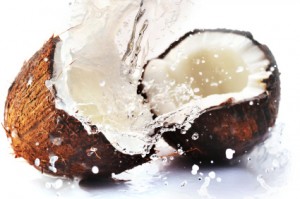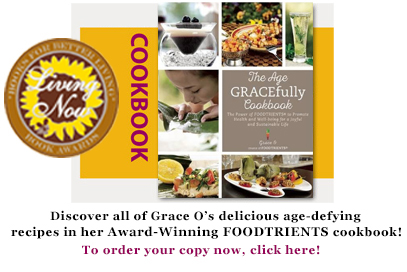Debunking the Myth of Coconut

I occasionally ate coconuts, drank coconut water or cooked with coconut oil when I was growing up in the tropics of southeast Asia, because I had always been told by my father that the fat in coconuts was bad for my health. My mother would regularly add warm coconut oil to my hair to make it lustrous. Only after I moved to America and started hearing that coconuts might actually be good for you and help in loosing weight, did I start research the subject. I concluded from this research that coconut does not at all deserve its negative reputation—despite what my father told me growing up.
Coconuts do have a high fat content, as do avocados and olives. The fat in avocados and olives is monounsaturated and therefore good for our bodies. It doesn’t contribute to bad blood cholesterol. The fat in coconuts is saturated fat, which is normally bad for you, especially when found in meat and other animal products such as milk and cheese. The saturated fat in coconuts, however, is made up of medium-chain fatty acids versus the long-chain fatty acids found in meat and dairy products. Medium-chain fatty acids (or medium chain triglycerides, abbreviated as MCT or MCFA) found in plants is easy for the body to break down and turn into energy. The MCFA in coconut also helps increase metabolism.
In his daytime television show, Dr. Mehmet Oz talked about the bad rap coconut oil has been given over the years because of its fat content. He pointed out that olive oil and coconut oil both contain 13 grams of fat and 119 calories per tablespoon. He went on to say, “Coconut oil has a bad rap because it’s saturated—it’s hard at room temperature, but the scientific research on this is changing all that we know about coconut oil.”
Dr. Nicholas Perricone talks about the virtues of coconut oil in his book, Forever Young. He says, “Virgin coconut oil is a medium-chain saturated fat (MCFA) that speeds weight loss, lowers cholesterol, reduces the risk of heart attacks, and improves diabetic conditions.” Not bad for an oil that’s been wrongly maligned for years because of its high fat content.
 I also learned in my research that coconut oil and coconut milk contain lauric acid which has antifungal and antibacterial properties. The book Healing Spices by Bharat B. Aggarwal, Ph.D., provides this great tidbit of information: “Researchers in Iceland found that lauric acid and capric acid (another MCT in coconut) killed Candida albicans, the fungus that causes yeast infections.” How wonderful! In the book Coconut Cures: Preventing and Treating Common Health Problems with Coconutby Bruce Fife, N.D., I learned that coconut milk makes vitamins like A, B, D, E and K more available to our bodies. On Fife’s website, www.coconutresearchcenter.org, you can find more information about the health and nutritional aspects of coconut and coconut oil.
I also learned in my research that coconut oil and coconut milk contain lauric acid which has antifungal and antibacterial properties. The book Healing Spices by Bharat B. Aggarwal, Ph.D., provides this great tidbit of information: “Researchers in Iceland found that lauric acid and capric acid (another MCT in coconut) killed Candida albicans, the fungus that causes yeast infections.” How wonderful! In the book Coconut Cures: Preventing and Treating Common Health Problems with Coconutby Bruce Fife, N.D., I learned that coconut milk makes vitamins like A, B, D, E and K more available to our bodies. On Fife’s website, www.coconutresearchcenter.org, you can find more information about the health and nutritional aspects of coconut and coconut oil.
With so many health benefits, coconuts are definitely being added to my diet. I use virgin coconut oil to sauté vegetables when I’m creating Asian or Indonesian dishes. I use shredded, toasted coconut in Indian-style rice dishes. I also incorporate coconut milk in my pudding recipes. The richness of the coconut milk is very filling without being heavy or hard to digest.
In my Sweet Potato and Jackfruit Pudding recipe, I cook yellow and orange cubes of sweet potato in coconut milk before adding bright yellow strips of canned jackfruit—the world’s largest tree-fruit that tastes somewhat like mango and is high in antioxidants. Then I stir in cooked Minute Tapioca to give the pudding body. It can be eaten warm or cold, as a breakfast dish or as a dessert. Now that I have started to develop a taste for coconut, I find these dishes taste delicious morning or night.

